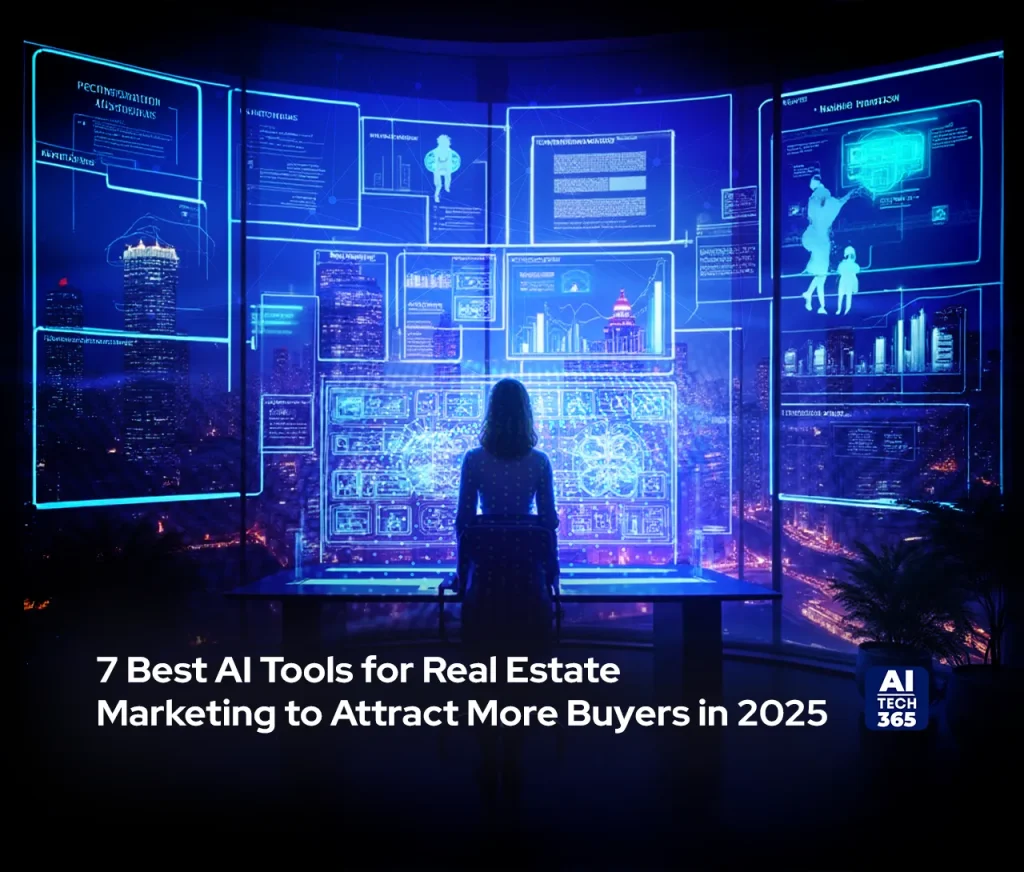Real estate relies on first impressions and smart positioning. For CTOs and AI specialists, the industry offers a unique look at digital transformation. The classic yard sign and open house still exist, but new smart tools now dominate. By 2025, real estate marketing won’t just need a digital presence. It needs an AI system that emphasizes precision, personalization, and prediction.
Agents and brokerages don’t struggle with a lack of data anymore. Instead, they face an overwhelming amount of it. Winners will use data to stand out. They will understand what buyers need and offer relevant experiences widely. A well-chosen AI toolkit is not just helpful; it’s essential for growth. This exploration looks at advanced AI tools. These tools are changing how we attract buyers, speed up sales cycles, and boost return on investment.
Intelligent Property Visualization and Staging
Picture a buyer scrolling through listings late at night. They can see a property and also imagine it transformed to fit their style. This is the power of AI-driven visualization. Tools like BoxBrownie.com and Styldod now provide more than virtual staging. They use generative AI for amazing virtual renovations. An old kitchen can become a modern cooking space with just one click. A plain room can be filled with custom furniture that shows the buyer’s style. This is possible because of advanced diffusion models.
The impact is profound. Studies show staged homes sell up to 73% faster and command 5–10% higher offers than unstaged ones. Virtual staging also makes financial sense, costing 90–95% less than physical staging, which typically runs into thousands per property. With demand rising, 42% of staging projects in 2025 now use virtual staging, compared with just 8% in 2020.
Properties sell faster because buyers feel an emotional connection. They see a space that feels like home. These tools eliminate the imagination gap that often hinders the sale of empty or dated homes. For the marketing leader, this means a strong tool. It boosts engagement and increases how long people view listings. In the end, it generates more qualified leads who can picture their life in those spaces.
Hyper-Personalized Content and Campaign Automation
The era of generic email blasts is conclusively over. Platforms like HubSpot and Drift now use AI in ways that seem almost magical. They analyze a lead’s digital body language. This covers the listings they look at, the content they download, and the neighborhoods they search frequently. This helps create a dynamic and evolving buyer profile. This intelligence fuels hyper-personalized automated campaigns.
An agent can now automatically send a potential buyer a condo that fits their exact criteria. They’ll also include a personalized video message explaining why it meets the buyer’s needs. The AI creates engaging, human-like content. It works for social media ads, emails, and blog posts. It’s designed for different audience segments. This type of personalization makes marketing sharper. It boosts conversion rates and creates a feeling of individual attention. This helps build trust. Personalized emails deliver six times higher transaction rates, while AI-driven campaigns convert 40% better than traditional social outreach
Predictive Analytics for Prospecting and Pricing
The best use of AI might be in its ability to predict outcomes. Skyline AI and HouseCanary use large datasets.
They include:
- Historical sales
- Local market trends
- School district ratings
- Future development plans
- Social sentiment
This data helps them make accurate forecasts. This helps agents find the best potential sellers. These are homeowners who are likely to list their property before selling. It’s a strong prospecting tool.
Also, these analytics engines offer unmatched accuracy in valuing properties. AI goes beyond basic market analysis. It considers micro-trends and local changes. This helps suggest the best listing price. The goal is to boost both the speed of sale and the final sale price. For a brokerage, this means using resources wisely. It helps win more listings with data-driven confidence that appeals to smart homeowners.
Also Read: Understanding Veo 3: The Technology Behind Google Flow’s Video Generation
AI-Powered Video Creation and Personalization
Video is the top content type, but making high-quality videos can take a lot of time and money. This barrier has been utterly demolished by AI video platforms such as Synthesia and Pictory. These tools help agents create high-quality, avatar-led video presentations. They use a simple text script. They can create virtual property tours. These tours have automated voiceovers in multiple languages. This makes listings easy for a global audience to access.
Moreover, AutoReel, launched in May 2025, is the first AI-powered real estate video platform that instantly converts static listing photos into cinematic videos, without any filming or editing needed
The true magic, however, is in dynamic personalization. Picture this: an AI avatar greets the buyer by name in a video tour of a property. It points out features that match their interests. This mix of video and personalization creates a strong ‘wow’ factor. It’s hard to ignore and really boosts engagement. This also makes a brand seem tech-savvy and focused on customers.
Conversational AI and Intelligent Chat Interfaces
A website works as a 24/7 lead generator. But it needs someone available to answer questions anytime. AI chatbots and voice assistants have changed a lot. They now do more than just answer FAQs. They’re becoming smart conversational partners. ManyChat and Intercom use natural language processing. They engage website visitors in meaningful chats. These tools qualify leads, set up appointments, and quickly answer tough questions about financing and neighborhood amenities.
This technology makes sure every lead is attended to, no matter when it arrives. These smart interfaces handle initial qualification and gather data. This lets human agents focus on important interactions. The sales funnel improves, leading to better conversion rates from the first click to the signed contract.
Generative AI for Dynamic Copy and Content
Writing strong descriptions for each listing can be repetitive and draining. Generative AI writing assistants, such as Jasper and Copy.ai, are changing the game. AI can create different marketing copies by adding key details about a property. For example, mention a modern kitchen, a spacious backyard, and nearby parks. These are tailored for different platforms.
It can create a poetic description for the main listing. It also makes punchy social media posts and focused email blasts. It also adds important SEO keywords, helping with organic discoverability. This doesn’t replace the human touch; it amplifies it. The agent can refine the AI-generated framework and add personality. This saves a lot of time and keeps quality consistent across all marketing channels.
Smart Social Media Advertising and Targeting
AI has completely reinvented the social media advertising stack. Meta and Google’s native advertising platforms offer some of the most powerful AI tools today. Their algorithms can find and target lookalike audiences with great accuracy. They identify new users who resemble an agent’s best past clients.
They can A/B test ad creative, copy, and landing pages all the time. This helps them learn and optimize in real-time. They can spend their budget on the best combinations. This way, they won’t need constant human help. This lowers the cost per lead and boosts return on ad spend. Every marketing dollar works hard to attract buyers.
Strategic Integrations and New Entrants
New entrants and funding-backed growth signals indicate just how hot this space has become:
- Synthesia, a leader in AI video, recently closed a US$ 180 million Series D round in January 2025, elevating its valuation to US$ 2.1 billion, cementing its role in scalable avatar-based and generative video for enterprise users, including real estate marketers.
- Omneky, originally focused on AI-generated product visuals, has expanded rapidly. In 2025, it launched Smart Ads, which generates on-brand omni-channel campaigns autonomously. In 2025, it unveiled Campaign Launcher, allowing marketers to instantly publish personalized campaigns across Meta, Google, and TikTok via one dashboard.
- Nestopa, Thailand’s first AI-powered real estate platform, has integrated AI features like automated announcement writing, listing recommendations, and agent ranking. In 2024, it went international by launching a portal in Dubai and by early 2025 was operating with over 250,000 active listings across Thailand.
Integrating the Future
The tech executive has a clear takeaway from this landscape. The future of real estate marketing isn’t just one solution. It’s a mix of specialized AI tools working together. The goal is to build a smooth ecosystem. Here, predictive analytics finds opportunities. Generative AI creates content. Personalization engines deliver that content. Then, conversational interfaces capture leads. All these elements work together in a cycle.
The brokerages and agents that succeed in 2025 will see this not as a cost, but as a key strategy. They will use these tools to work faster, gain better insights, and connect more meaningfully with their market. In real estate, using artificial intelligence is not only innovative but essential. It forms the backbone of successful marketing today. The question is not if you should adopt these tools. It’s about how quickly you can integrate them. This will help you create a smarter, faster, and more effective operation.

